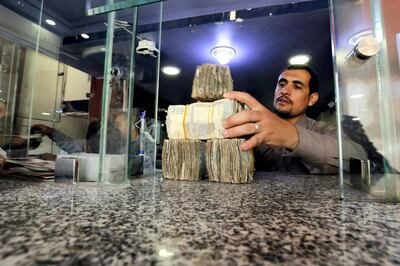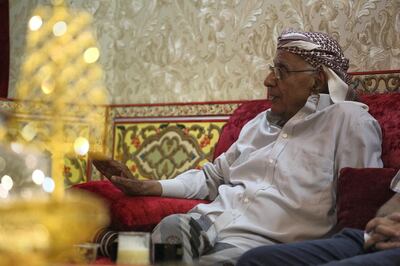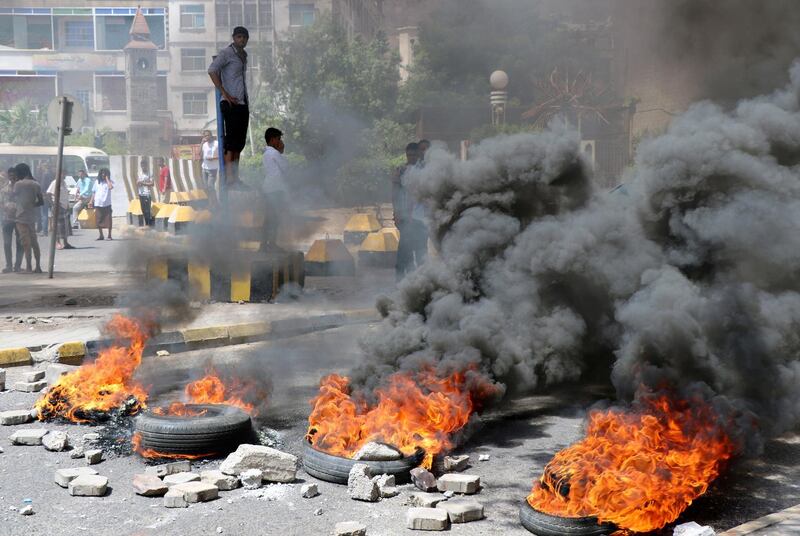It is more than two years since Al Qaeda in the Arabian Peninsula was ousted from Mukalla. While smouldering tires do occasionally block the road along the Yemeni city’s corniche, terrorists no longer roam its streets openly and squares no longer serve as theatres for their pitiless punishments.
The great preoccupation for locals is no longer everyday security but money after a rial crisis gripped the country. Disturbances about the lack of cash welled up in recent weeks. The Houthi takeover of Yemen that began in 2014 led to a destabilisation of the country’s financial system with the hasty relocation of the central bank a year later. In places like Mukalla, the struggle to stave off the ravages of the national currency collapse is felt by all. There are no effectively two centres of monetary policy, one in Sanaa and one in Aden.
As the currency has dropped below 600 rials to the dollar in recent weeks, life has become harder for Huda Abduallah.
A gynaecologist in Mukalla’s Hospital for motherhood and childhood, the 45-year-old doctor now requires treatment herself – follow-up appointments for breast cancer she was diagnosed with three years ago.
On her current salary of 76,000 rials, one course of chemotherapy would have cost almost half a year’s pay, so she instead makes regular trips to Saudi Arabia for treatment, where she receives free health insurance through her husband’s employment.
Like many others, she has taken a second, part-time, job where she teaches in the local university. "I'm exhausted," she tells The National plainly.
The value of government salaries paid in the rial has declined throughout the war. The disruptions are manifold, with pay often coming late and sometimes not at all. The falling currency has pushed the price of many things up, raising the cost of living in a country where millions were already on the precipice of poverty.
“I used to go to work on the bus and pay 7,000 rials, now its 15,000 rials”, she says. The cost of transportation was such an issue that last year the local Governor stepped in to personally pay the transport costs of hospital staff living outside the city.

For Ahmed Ali Bin Aram, 50, who works in a fish-canning factory outside the city, the pressures inflicted by the collapse are written on the face of his family. “I have four children, every day it seems we have less rice, and less bread. I spend more but get less. At least we have the sea, the fish stay even when there is a crisis”.
Prior to the current conflict, the central bank pegged the currency at a manageable 215 rials to the $1. But a recent paper by The Sanaa Centre noted that as of the first week of September it had been trading at 620 rials in the black market.
International efforts are afoot to bring about some sort of reunification, and an IMF-backed meeting in Kenya next month will attempt to do just that. The Nairobi plan will look to overcome the problems of two central banks, by instead operating the institution out of four regional offices. Western diplomats say bringing the institution’s former governor, Mohammed bin Hummam, back in from the cold to oversee the plan is integral to its implementation.
This decline is a long way short of the devaluation seen in some other countries like Zimbabwe, and even Lebanon at the height of the civil war. But Yemen’s dependence on food imports means even modest currency drops can push the cost of food out of people’s reach.
Under Mr Hummam’s governorship, the central bank was a meritocratic oasis in a country where state institutions were riddled with corruption. He sent staff abroad for training, and during his eight-year tenure staved off a foreign currency crisis and kept government salaries flowing – including to Houthi-held Sanaa.
As Mansour Rageh, chief economist at the independent think tanks Sanaa Centre for Strategic Studies, says: “He kept the central bank away from the conflict.”
______________
Read more:
Yemen central bank nearly doubles interest rate to halt riyal plunge
Saudi Arabia's $2bn cash transfer gives hope to Yemenis
Yemenis join the line of refugees seeking help in Jordan
______________
In 2016, President Abdrabbuh Mansur Hadi attempted to restore some control over the monetary system by establishing an officially backed institution in recaptured Aden, though he did so without ensuring the logistical and financial assets necessary to ensure it functioned. Speaking of its efforts in Yemen earlier this year, the IMF’s regional director Jihad Azour said it was working with the internationally recognised government to overcome the challenges of the fractured economic system.
“We try to help them preserve the basic core functions of the government, namely, at the central bank, and at the ministry of finance. In addition to that, we are in regular contact and dialogue with the community to raise the awareness of this community about the importance of helping Yemen,” he said at a briefing in April.
In January, Saudi Arabia announced a $2 billion tranche of funds that the central bank can draw on to facilitate imports. The funds are being lined up to underwrite imports of grain, and other basic commodities at stable prices to provide some immunity from the currency collapse. And this week King Salman approved a request by Mr Hadi for a further $200m for the central bank.
Now retired, Mr Hummam is cautious when sharing his views on what is collectively referred to as “the crisis” - one which has pushed Yemenis to the streets in anger. But one thing he is clear on, re-unifying the central bank can help.

“If you unify the central bank, under one administration, that will bring confidence.
"The infrastructure [of the central bank] remains in Sanaa, they are starting to rebuild [in Aden], but of course that will take time," he tells The National at his home
“Place that bank together under one management, bring Sanaa and Aden all together, under one management.”
He adds there could be other benefits too, such as opening a channel for dialogue between the government, and the Houthis.
Mr Hummam insists the central bank must transcend politics, as it did under his tenure as governor. It must be a rare neutral actor in an otherwise polarising conflict.
“Where there’s a will, there’s a way”, he whispers, a faint smile breaking on his face.






